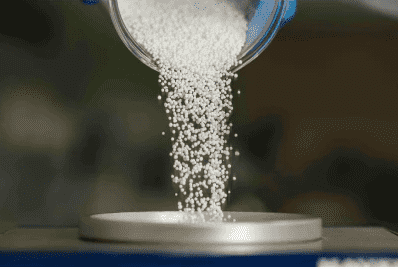Ammonium Nitrate is a white, crystalline solid that looks like salt. it is a hazardous chemical, having caused dozens of severe explosions worldwide. Ammonium nitrate in its pure form is stable, but heat and confinement or a severe shock can lead to detonation that can be disastrous. Managing scientifically in a targeted manner has become the highest priority in risk management and control of this substance.
Long-term storage of ammonium nitrate poses a major risk due to contamination. While the thermal decomposition temperature of ammonium nitrate is 200°C, the presence of contaminants can significantly reduce this.
What is Ammonium nitrate?

Ammonium nitrate(also known as Ammonium saltpetre and Ammonium nitricum) is a colourless crystalline substance with the chemical formula NH4NO3. It readily absorbs water and is soluble in water at 20° C. Ammonium nitrate is commonly used in fertilizers, herbicides, and insecticides. It is also used in explosives for blasting rocks and in mining.
Ammonium nitrate Hazards
Pure Ammonium nitrate does not burn, but it accelerates the burning of combustible materials and produces toxic oxides of nitrogen during combustion. So, it should not be stored near combustible substances. It has three main hazards:
Toxic decomposition products
Pure ammonium nitrate melts at 170° C and decomposes above 210° C producing clouds of toxic fumes that may be yellow or brown.
Fire due to oxidizing nature
Ammonium nitrate is an oxidizing agent, it supplies oxygen to the fuel in a fire and supports burning even when air is excluded.
Explosion
In the fire, ammonium nitrate may form and if confined, may explode. This is because hot ammonium nitrate becomes very sensitive to shock particularly if it contacts incompatible materials.
Ammonium nitrate Storage
Ammonium nitrate should be stored in containers constructed of material that will not burn such as steel, concrete or brick. Storage conditions of Ammonium nitrate are listed below:
- If ammonium nitrate is stored outside, it should be protected from the weather.
- Ammonium nitrate should be kept dry since the risk of an explosion increases when the product becomes caked.
- Ammonium nitrate storage location should be away from sources of heat, fire or explosion.
- Main electrical switches and fuses must be installed outside the storage area to minimize the risk of fire.
- Ammonium nitrate should not be stored in the same stack as other products.
- Ammonium nitrate should be stored away from combustible materials by a distance of at least 8 m.
- Prohibit smoking in storage areas and display NO SMOKING signs.
What chemicals are incompatible with Ammonium nitrate?
Ammonium nitrate must be stored to avoid contact with combustibles, strong acids, metal salts, oxidizing agents, etc. It is incompatible with the following materials including:
- Flammable or combustible liquids such as petrol, diesel, oil, grease, paint, and carbonaceous material.
- Flammable solids.
- Powdered metals, alkali metals, zinc or galvanised iron, copper or copper alloy.
- Organic chemicals, acids, alkalis, and other corrosive materials.
- Compressed flammable gases.
- Oil-based pesticides.
- Contaminating materials including caustic soda, cement, charcoal, coal, fish oils, foam rubber, naphthalene, vegetable oils and other drying oils.
Ammonium nitrate should not be stored in the same building as incompatible materials. The risk of fire or explosion is increased if ammonium nitrate is mixed with combustible or incompatible materials.
What are the safety precautions for Ammonium nitrate?
Operators should avoid contact with skin, eyes or clothing. Plus, they should avoid ingestion and inhalation. Ammonium nitrate should be kept away from clothing and other combustible materials. Some of the necessary first-aid measures are described below:
- In the case of inhalation, provide fresh air. If symptoms persist, seek medical advice.
- In the case of skin contact, rinse the skin with water. If symptoms persist, seek medical advice.
- In the case of eye contact, irrigate copiously with clean, fresh water for at least 10 minutes, holding the eyelids apart. In case of eye irritation consult an ophthalmologist.
- In the case of ingestion, rinse your mouth. Call a doctor if you feel unwell.
FAQ
Is Ammonium nitrate flammable or explosive?
Pure ammonium nitrate is stable and will explode only under extraordinary circumstances. However, the addition of combustible materials such as sugar, grain dust, or other organic contaminants, even in fairly low percentages, creates a dangerous combination and the Ammonium Nitrate mixture becomes far more susceptible to detonation.
Is Ammonium nitrate harmful to humans?
Under normal handling conditions, ammonium nitrate is not harmful. However, inhalation of high concentrations of ammonium nitrate dust can cause respiratory tract irritation.
What hazard class is Ammonium nitrate?
Ammonium nitrate is classified as a Class 2 oxidizer.
